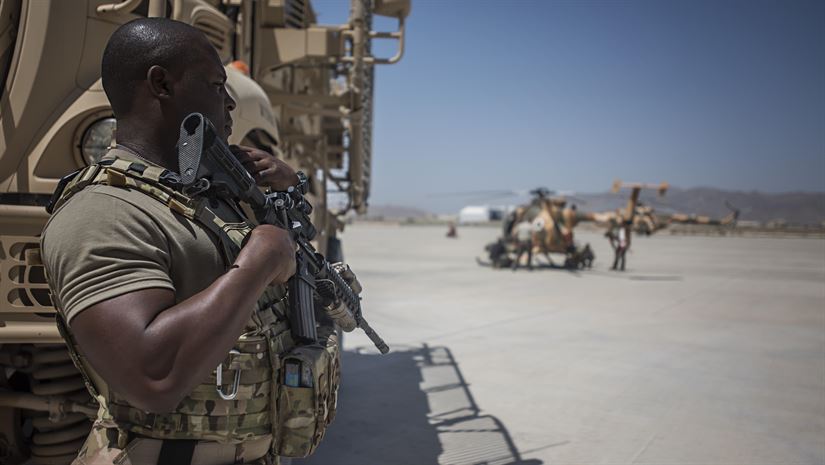Afghans Want More US Troops? Show Us Results
Posted on

US troops protecting Afghan helicopter 2017
It looks as if the Trump administration will soon send 3,000 to 5,000 U.S. troops to fight in Afghanistan, the theater of America’s longest war. The mission — training and advising (and bolstering) the Afghan national security forces — will remain the same even though we’ve seen this play out more than once: the verdict has been the same. We spend a hefty price, only to come out years later disappointed with the results.
While President Donald Trump hasn’t made his decision yet, it’s highly likely he will defer to his field commanders. Gen. John Nicholson and Defense Secretary James Mattis will likely receive what they are requesting, so Army and Marine Corps troops may soon be sleeping and working on the very same ground, doing the very same jobs, fighting the same enemy in the exact same way.
If this sounds similar, it’s because it is — we had the exact same debate in 2008, 2009, 2011, and 2014.
The central question that hasn’t been asked is, how several thousand additional personnel can accomplish what 140,000 additional soldiers couldn’t.
An even more fundamental question—one that the foreign policy establishment is either too uncomfortable or blind to discuss amongst itself—is whether any of these objectives are achievable to begin with.
The United States has sacrificed too much and spent too long in Afghanistan over the last decade and a half for U.S. policy to persist with the status quo.
Before we send more troops, the Trump administration should establish clear benchmarks the Afghan government must meet within a reasonable amount of time. If Kabul wants continuous financial and security aid over the next several years, the Afghan government must step up and do the difficult and essential work of proving they are competent enough to warrant further assistance from U.S. taxpayers.
From now on, conditionality should be the name of the game.
First, Afghan President Ashraf Ghani and Chief Executive Officer Abdullah Abdullah must begin to act like leaders. The National Unity Government both men lead has been hampered with unnecessary, internal squabbles that border on pettiness. The two electoral rivals must demonstrate to the international community, and the United States in particular, that they can work together. In other words, they must demonstrate they can put the interests of Afghanistan ahead of their own.
That means no more habitual blocking of one another’s nominees for ministry portfolios, no more airing of grievances in the media, no more backstabbing leaks designed to embarrass the other camp, and a commitment from both men that meetings will be held on a weekly basis with a specific agenda.
Second, there must be significant progress under the terms of the agreement that established the national unity government. Two and a half years after that deal was negotiated, guidelines have been ignored and steps that should have been completed by now haven’t even started. It took six months before the electoral commission that is designed to overhaul how Afghanistan conducts elections in the future was even set up. Parliamentary elections originally scheduled for 2015 have been delayed repeatedly.
And because those elections have been postponed, the national unity government has been forced to extend the current parliament’s term for an undetermined period of time. The deal, in other words, isn’t being implemented. That must change, and fast; at the very least, President Ghani and Chief Executive Abdullah should speed up the electoral reform process that both agreed to support.
The third agenda item is a crackdown on corruption, such as ghost soldiers—people who are no longer in the army or police but still remain on the official rolls. More than a year after the U.S. Special Inspector General for Afghanistan Reconstruction (SIGAR) raised concerns about this problem, the Pentagon still can’t quantify how many Afghan soldiers and police officers are actually on active duty.
Fortunately, the U.S. military has gone to work cleaning the rolls, throwing 30,000 names off the list. But Washington won’t be able to determine whether more ghost soldier positions need to be eliminated until and unless Kabul provides full cooperation, transparency, and honesty about which battlefield commanders are using the system to their personal financial advantage. The U.S. provides roughly $4 billion a year to the Afghan national security forces, so Kabul has a big responsibility to do all it can to ensure that this money is being spend on actual soldiers.
If the U.S. and NATO are held to certain financial commitments for the next several years, it should be expected that the Afghan government—a government that is wholly dependent on international support for financial solvency and basic survival—is held accountable for the promises that it agreed to implement.
If Afghan political leaders can’t or won’t reform, there is no reason why the Afghan government deserves to be the recipient of any more checks from the American taxpayer. Nor do they deserve any more sacrifices from the U.S. soldier, sailor, airman, or marine.
Daniel DePetris is a fellow at Defense Priorities, a Washington thinktank.
Subscribe to our newsletter
Promotions, new products and sales. Directly to your inbox.
